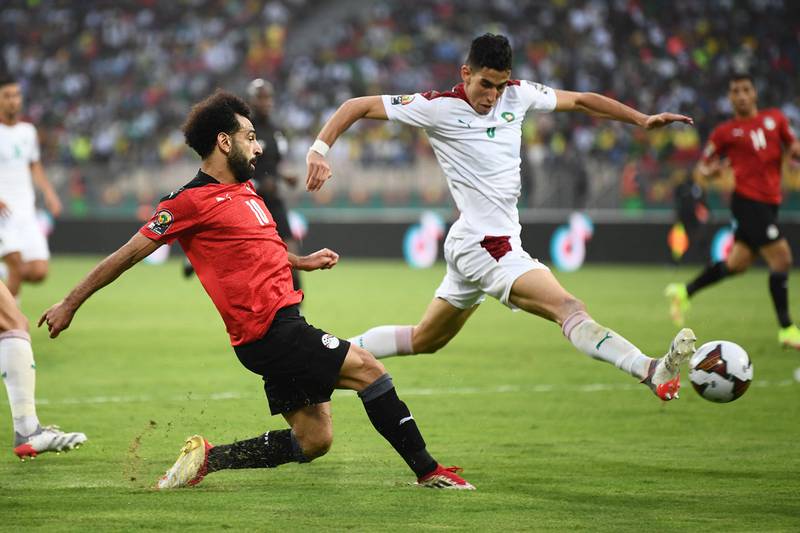Mohamed Salah is at peak of his powers as Egypt eye Africa Cup of Nations glory

Mohamed Salah, Egypt’s captain and lodestar, was thought to be suffering an international goal-drought coming into the Africa Cup of Nations. These things are relative, but as he has been in such eclectic form for his club Liverpool, then, yes, no goals in five Egypt fixtures did count as an unusually barren spell.
The Pharaohs have teetered a few times during an Afcon which, as Salah on Sunday reminded compatriots, is “tough for everyone,” listing its fallen heavyweights. “Nigeria, the best team in the group stage, are out,” he pointed out. “Algeria, who won it last time, lost in the group stage.”
He might have added Morocco, who were leading their quarter-final until well into the second-half of a short-tempered North African derby. At that point Egypt teetered, and, as at almost every crossroads at this Afcon, Salah steered them back from the brink.
For all that he arrived in Cameroon on the back of five goalless matches for his country, Salah senses he has never been at an international tournament feeling closer to the peak of his powers.
When he returns to Liverpool next week, either with a bronze, silver, gold or no medal from Afcon 2021, he will be in the same place in the list of Premier League goalscorers for the season as when he left almost a month ago: At the top, with 16 from 20 matches.
There have been seven Salah goals in the Champions League, too, at a rate of almost one every hour. And here’s the statistic that marries so well with all those club goals: only one player in England’s top division — Salah’s colleague Trent Alexander-Arnold — has provided more passes that led to so far this season as Salah, with his nine assists.
Egypt have nobody quite so tuned to Salah’s wavelength as Alexander-Arnold, but in international football, with its limited, uneven timetable, it is next to impossible to cultivate the same patterns and relationships as between club teammates. Nor, over the last three weeks, have the playing surfaces at some of the stadiums in Cameroon allowed Egypt to develop slick passing routines, to trust their through-balls.
The effect for a team naturally geared towards releasing their best and quickest striker to run behind opposition defences, has been vexing at times. “It was hard for us at the start, up until we could adapt,” said Salah.
The captain pointed the way, proving an exceptional problem-solver besides his other skills. He has tirelessly chased space, foraged in deep positions to act as auxiliary midfielder. There has been a good deal of frustrating trial-and-error around his delivery from free-kicks and corners.
Beaten 1-0 by Nigeria, Egypt were being held by Guinea-Bissau deep into the second half of their second group match when Salah first reset his country’s course, drifting away from his marker to meet a cross and stab an angled volley underneath the goalkeeper. The relief was palpable.
Through the next four hours of tournament action, Egypt scored only once. The last-16 tie against Ivory Coast went to penalties, amid a crisis: Egypt’s admired goalkeeper, Mohamed El Shenawy withdrew injured. His deputy, Gabaski, would be the instant hero, saving the Ivorian Eric Bailly’s spot-kick. But the pressure moment fell on Salah, required to convert Egypt’s fifth penalty to put them through.
That felt like a watershed. At the last Afcon, Egypt, the hosts, were eliminated at the last-16 phase, a tired Salah tightly marked by a dogged South Africa, who became unlikely spoilsports of a campaign around which a decade’s worth of Egyptian hope had been invested.
Salah has spent much of his adult life as designated figurehead of a fervently-sought renaissance in Egyptian football. Between 2006 and 2010, the Pharaohs won successive Afcons. After 2012, amid great social upheaval and violence at stadiums, the domestic league was suspended for the best part of two years. The national team failed to even reach the next three Afcons.
They needed a superstar: Salah’s goals fired them to the 2017 tournament, and all the way to a losing final against Cameroon, with whom they will contest Thursday’s semi-final. Salah then steered Egypt to their first World Cup for 28 years, but went to Russia in 2018 gingerly nursing a damaged shoulder, from a foul on him in Liverpool’s Champions League final a few weeks earlier. The injury diminished him, and the team.
That’s three major tournaments, and in different ways, three crushing disappointments. Hence the vivid impression that, in Cameroon, at his third Afcon, Salah is utterly tigerish, full of stamina and on a mission.
Against Morocco, 1-0 down, he swung the tie by with a poacher’s goal followers of Liverpool would instinctively recognise. The more creative Salah then put Egypt into the semi-final, brilliantly setting up the extra-time winner and looking again like the footballer who, on his day, is as hard to stop as any in the world.
